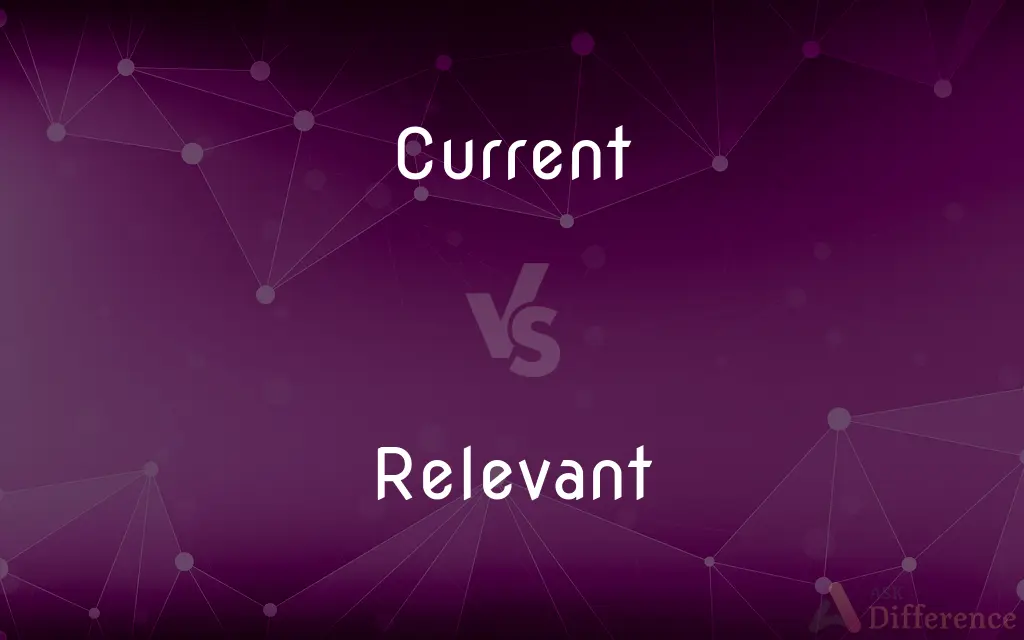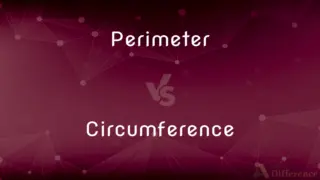Current vs. Relevant — What's the Difference?
Edited by Tayyaba Rehman — By Fiza Rafique — Updated on April 5, 2024
Current refers to what is happening now or most recently, emphasizing timeliness, while relevant pertains to the significance or applicability to the matter at hand.

Difference Between Current and Relevant
Table of Contents
ADVERTISEMENT
Key Differences
Current is about the present time, focusing on the latest developments or events. It underscores the immediacy or the most recent state of affairs. For instance, current news stories are those happening or reported just now. Whereas relevant deals with the importance or pertinence to the subject being discussed. A relevant fact in a discussion is one that directly impacts or is connected to the topic.
The notion of being current is particularly crucial in fast-paced domains like technology and media, where updates and changes occur rapidly. Being current in such fields means staying informed about the very latest advancements or news. On the other hand, relevance is key in contexts like research and debate, where the focus is on the applicability and contribution of information to the specific subject matter.
Current information may not always be relevant to a specific discussion or need, as it simply represents what is new or recent, regardless of its significance to the topic at hand. Conversely, relevant information might not be current, as older data or research can still have significant implications for a particular subject.
In digital content, current content is often highlighted to attract viewers looking for the latest information, utilizing timestamps or "latest" tags. Whereas, content is labeled as relevant based on its thematic connection to the user's search intent or the ongoing discussion, often curated through algorithms or tags related to the subject matter.
Social media platforms frequently blend the concepts of current and relevant by offering feeds that prioritize both newness and personal or societal relevance, attempting to cater to the user's desire for timely information that is also significant to their interests or the wider community.
ADVERTISEMENT
Comparison Chart
Definition
Pertaining to the present time or most recent.
Pertaining to the significance to the matter.
Key Focus
Timeliness and recency.
Importance and applicability.
Context Usage
Technology, news, fashion.
Research, discussions, debates.
Examples
Latest news, current trends.
Relevant theories, pertinent examples.
Relationship
May not be relevant.
Can be from any time if it applies.
Compare with Definitions
Current
Pertaining to the present time.
The current temperature is unusually high for this time of year.
Relevant
Suitable for the purpose or occasion.
Please keep your comments relevant during the meeting.
Current
The flow of water or air in a definite direction.
The boat struggled against the strong current.
Relevant
Pertinent evidence or information.
The lawyer presented all the relevant documents to the court.
Current
In electricity, the flow of electric charge.
The device measures the current passing through the circuit.
Relevant
Bearing upon or related to the subject.
The professor cited articles relevant to her lecture.
Current
Recently developed or updated.
She's reading the current edition of the software manual.
Relevant
Closely connected or appropriate to the matter at hand.
He asked me several relevant questions during the interview.
Current
Prevalent, especially in public affairs or trends.
The current mood of the city is tense.
Relevant
Applicable to the current topic or situation.
That's an interesting point, but it's not relevant to our discussion.
Current
A body of water or air moving in a definite direction, especially through a surrounding body of water or air in which there is less movement
Ocean currents
Relevant
Closely connected or appropriate to what is being done or considered
The candidate's experience is relevant to the job
What small companies need is relevant advice
Current
A flow of electricity which results from the ordered directional movement of electrically charged particles
This completes the circuit so that a current flows to the lamp
Magnetic fields are produced by currents flowing in the cables
Relevant
Having a bearing on or connection with the matter at hand.
Current
The general tendency or course of events or opinion
The student movement formed a distinct current of protest
Relevant
Meaningful or purposeful in current society or culture
Thought that the traditional male role of breadwinner was no longer relevant.
Current
Belonging to the present time; present-day
Current events.
Current leaders.
My current address.
Relevant
Related, connected, or pertinent to a topic.
Current
Being in progress now
Current negotiations.
Relevant
(Usually and especially) Directly related, connected, or pertinent, with important ramifications or implications.
His mother provided some relevant background information concerning his medical condition.
Current
Commonly accepted or used; prevalent
Current fashions.
Current technology.
Relevant
Not out of date; current.
Current
Passing from one to another; circulating, as money or a rumor
Current bills and coins.
Relevant
Relieving; lending aid or support.
Current
Running; flowing.
Relevant
Bearing upon, or properly applying to, the case in hand; pertinent; applicable.
Close and relevant arguments have very little hold on the passions.
Current
A steady, smooth onward flow or movement
A current of air from a fan.
A current of spoken words.
Relevant
Sufficient to support the cause.
Current
The part of a body of liquid or gas that has a continuous onward movement
Rowed out into the river's swift current.
Relevant
Having a bearing on or connection with the subject at issue;
The scientist corresponds with colleagues in order to learn about matters relevant to her own research
Current
A general tendency, movement, or course.
Relevant
Having crucial relevance;
Crucial to the case
Relevant testimony
Current
A flow of electric charge.
Current
The amount of electric charge flowing past a specified circuit point per unit time, usually expressed in amperes.
Current
The generally unidirectional movement of a gas or fluid.
Current
The part of a fluid that moves continuously in a certain direction, especially (oceanography) nocap=a.
Current
(electricity) the amount of electric charge flowing in each unit of time.
Current
A tendency or a course of events
Current
Existing or occurring at the moment.
Current events
Current leaders
Current negotiations
Current
Generally accepted, used, practiced, or prevalent at the moment.
Current affairs
Current bills and coins
Current fashions
Current
(India) Electric; of or relating to electricity.
Current bill
Current shock
Current
(obsolete) Running or moving rapidly.
Current
Running or moving rapidly.
Like the current fire, that rennethUpon a cord.
To chase a creature that was current thenIn these wild woods, the hart with golden horns.
Current
Now passing, as time; as, the current month.
Current
Passing from person to person, or from hand to hand; circulating through the community; generally received; common; as, a current coin; a current report; current history.
That there was current money in Abraham's time is past doubt.
Your fire-new stamp of honor is scarce current.
His current value, which is less or more as men have occasion for him.
Current
Commonly estimated or acknowledged.
Current
Fitted for general acceptance or circulation; authentic; passable.
O Buckingham, now do I play the touchTo try if thou be current gold indeed.
Current
A flowing or passing; onward motion. Hence: A body of fluid moving continuously in a certain direction; a stream; esp., the swiftest part of it; as, a current of water or of air; that which resembles a stream in motion; as, a current of electricity.
Two such silver currents, when they join,Do glorify the banks that bound them in.
The surface of the ocean is furrowed by currents, whose direction . . . the navigator should know.
Current
General course; ordinary procedure; progressive and connected movement; as, the current of time, of events, of opinion, etc.
Current
A flow of electricity through a conductor;
The current was measured in amperes
Current
A steady flow (usually from natural causes);
The raft floated downstream on the current
He felt a stream of air
Current
Dominant course (suggestive of running water) of successive events or ideas;
Two streams of development run through American history
Stream of consciousness
The flow of thought
The current of history
Current
Occurring in or belonging to the present time;
Current events
The current topic
Current negotiations
Current psychoanalytic theories
The ship's current position
Common Curiosities
What does it mean when information is current?
Information is considered current if it is up to date or pertains to the present time.
Can outdated information be relevant?
Yes, outdated information can still be relevant if it has applicability or significance to the current subject matter.
What role does relevance play in education?
In education, relevance helps engage students by connecting learning materials to real-life applications and ensuring content is pertinent to the learning objectives.
How do I determine if something is relevant?
Something is relevant if it is closely connected, applicable, or important to the matter at hand.
How does relevance affect research?
Relevance is critical in research as it ensures that the information gathered and used is directly applicable to the study topic, enhancing the validity and impact of the findings.
Why is staying current important?
Staying current is important to remain informed about the latest developments and trends, which can be crucial in rapidly changing fields.
What makes a fact relevant in a discussion?
A fact is relevant in a discussion if it directly contributes to, clarifies, or supports the topic being debated or discussed.
Can information be both current and relevant?
Yes, information can be both current and relevant if it is up to date and directly related to the topic being discussed.
Is current news always relevant to everyone?
Not necessarily; current news may not be relevant to everyone as individuals have different interests and information needs.
Is current technology always the best choice?
Not always; while current technology may offer the latest features, it might not always be the most relevant or cost-effective choice for every situation.
How do social media platforms use current and relevant content?
Social media platforms use algorithms to present feeds that prioritize content considered both current (new) and relevant (significant) to the user.
How does culture affect perceptions of relevance?
Cultural backgrounds can influence what individuals consider relevant, as cultural values and norms affect priorities and interests.
Why might a current event not be relevant to a particular audience?
A current event might not be relevant to a particular audience if it does not align with their interests, needs, or the scope of their concerns or inquiries.
How do I keep my knowledge current?
Keeping knowledge current involves regularly updating oneself with the latest information and developments in one’s field of interest or profession.
Can relevance change over time?
Yes, what is considered relevant can change over time as the context, societal norms, or the field of study evolves.
Share Your Discovery

Previous Comparison
Perimeter vs. Circumference
Next Comparison
Drew vs. DrawAuthor Spotlight
Written by
Fiza RafiqueFiza Rafique is a skilled content writer at AskDifference.com, where she meticulously refines and enhances written pieces. Drawing from her vast editorial expertise, Fiza ensures clarity, accuracy, and precision in every article. Passionate about language, she continually seeks to elevate the quality of content for readers worldwide.
Edited by
Tayyaba RehmanTayyaba Rehman is a distinguished writer, currently serving as a primary contributor to askdifference.com. As a researcher in semantics and etymology, Tayyaba's passion for the complexity of languages and their distinctions has found a perfect home on the platform. Tayyaba delves into the intricacies of language, distinguishing between commonly confused words and phrases, thereby providing clarity for readers worldwide.















































